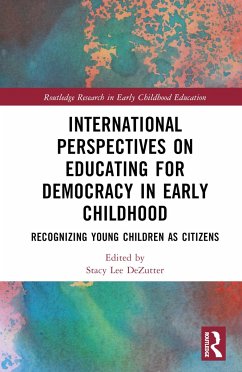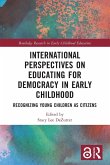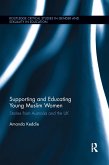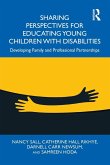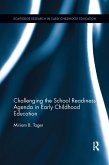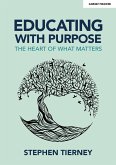International Perspectives on Educating for Democracy in Early Childhood
Recognizing Young Children as Citizens
Herausgeber: Dezutter, Stacy Lee
International Perspectives on Educating for Democracy in Early Childhood
Recognizing Young Children as Citizens
Herausgeber: Dezutter, Stacy Lee
- Gebundenes Buch
- Merkliste
- Auf die Merkliste
- Bewerten Bewerten
- Teilen
- Produkt teilen
- Produkterinnerung
- Produkterinnerung
This book brings together established and emerging scholars from around the globe to highlight new directions for research on young children as active, engaged citizens of classrooms. Chapters discuss the child-as-citizen in relation to issues including gender, class, race, tribal status, and linguistic diversity.
Andere Kunden interessierten sich auch für
![International Perspectives on Educating for Democracy in Early Childhood International Perspectives on Educating for Democracy in Early Childhood]() International Perspectives on Educating for Democracy in Early Childhood41,99 €
International Perspectives on Educating for Democracy in Early Childhood41,99 €![Educating for Humanity Educating for Humanity]() Neil TuckerEducating for Humanity53,99 €
Neil TuckerEducating for Humanity53,99 €![Supporting and Educating Young Muslim Women Supporting and Educating Young Muslim Women]() Amanda KeddieSupporting and Educating Young Muslim Women61,99 €
Amanda KeddieSupporting and Educating Young Muslim Women61,99 €![Sharing Perspectives for Educating Young Children with Disabilities Sharing Perspectives for Educating Young Children with Disabilities]() Nancy SallSharing Perspectives for Educating Young Children with Disabilities61,99 €
Nancy SallSharing Perspectives for Educating Young Children with Disabilities61,99 €![Nature, Spirituality, and Early Childhood Education Nature, Spirituality, and Early Childhood Education]() Ruth Wills (UK Liverpool Hope University)Nature, Spirituality, and Early Childhood Education74,99 €
Ruth Wills (UK Liverpool Hope University)Nature, Spirituality, and Early Childhood Education74,99 €![Challenging the School Readiness Agenda in Early Childhood Education Challenging the School Readiness Agenda in Early Childhood Education]() Miriam B. Tager (USA Westfield State University)Challenging the School Readiness Agenda in Early Childhood Education44,99 €
Miriam B. Tager (USA Westfield State University)Challenging the School Readiness Agenda in Early Childhood Education44,99 €![Educating with Purpose: The heart of what matters Educating with Purpose: The heart of what matters]() Stephen TierneyEducating with Purpose: The heart of what matters22,99 €
Stephen TierneyEducating with Purpose: The heart of what matters22,99 €-
-
-
This book brings together established and emerging scholars from around the globe to highlight new directions for research on young children as active, engaged citizens of classrooms. Chapters discuss the child-as-citizen in relation to issues including gender, class, race, tribal status, and linguistic diversity.
Hinweis: Dieser Artikel kann nur an eine deutsche Lieferadresse ausgeliefert werden.
Hinweis: Dieser Artikel kann nur an eine deutsche Lieferadresse ausgeliefert werden.
Produktdetails
- Produktdetails
- Routledge Research in Early Childhood Education
- Verlag: Taylor & Francis Ltd
- Seitenzahl: 346
- Erscheinungstermin: 8. Mai 2023
- Englisch
- Abmessung: 229mm x 152mm x 21mm
- Gewicht: 620g
- ISBN-13: 9781032135007
- ISBN-10: 103213500X
- Artikelnr.: 67262611
- Herstellerkennzeichnung
- Libri GmbH
- Europaallee 1
- 36244 Bad Hersfeld
- gpsr@libri.de
- Routledge Research in Early Childhood Education
- Verlag: Taylor & Francis Ltd
- Seitenzahl: 346
- Erscheinungstermin: 8. Mai 2023
- Englisch
- Abmessung: 229mm x 152mm x 21mm
- Gewicht: 620g
- ISBN-13: 9781032135007
- ISBN-10: 103213500X
- Artikelnr.: 67262611
- Herstellerkennzeichnung
- Libri GmbH
- Europaallee 1
- 36244 Bad Hersfeld
- gpsr@libri.de
Stacy Lee DeZutter is an Associate Professor of Education and Psychology and the Chair of the Education Department at Millsaps College in Jackson, Mississippi, USA.
1. Introduction: Recognizing Young Children as Citizens in Classrooms
Section 1: How should citizenship education be conceptualized? 2. Young
Children as Democratic Participants: Ethical Consideration for Research and
Practice 3. Challenges for Policy and Practice for Young Children's
Community Building Identified in a Study of Young Children's Civic Action
4. Gender, Sexual Identities and Citizenship Education: A Critical
Discourse Analysis of Canadian Kindergarten Curricula 5. Teaching
Demokrasia and Uraia in Tanzanian Pre-Primary Education Programs Teaching
Demokrasia and Uraia in Tanzanian Pre-Primary Education Programs 6.
Realistic Utopias of the Commons in Education 7. Collaborative Commentary:
How Should Citizenship Education Be Conceptualized? 8. Active Citizenship
Education with Young Children: Key Themes, Possibilities and Future
Research Directions Section 2: How Do Young Children Think About and Enact
Citizenship? 9. Citizen Children Raising Their Voices and Striving to Save
the Planet ... and Themselves 10. Investigating the Implicit: An
Exploration of Elementary Students' Conceptions of Gender 11. Using
Multimodal Assessment to Empower Children as Citizens After a Disaster
Event 12. "I Don't Want You to Say No, I Want You to Say Yes": One
Two-Year-Old's Transformative Dissent 13. Collaborative Commentary: How Do
Children Think About and Enact Citizenship? 14. Broadening the Scope of
Civic Education - Critical Contributions Section 3: How Do Teachers Support
Young Children as Citizens? 15. Children Are Citizens: Encouraging Civic
Agency in Our Youngest Learners 16. Teaching Children the Power of Their
Voice in a Preschool Classroom 17. Teaching the Black Lives Matter at
School: 13-Guiding Principles as Cultural Citizenship Education for Young
Children 18. Children's Empowered Inclusion in Early Childhood Education
for Sustainability 19. Comparing the Pacific and the Rural Northeast?
Meta-ethnographic Investigations of Citizenship(s) in Progressive ECE
Programs 20. Children as Citizens of a Global Society: Learning Together in
Culturally and Linguistically Diverse Classrooms 21. Collaborative
Commentary: How Do Teachers Support Children as Citizens 22. Love, Empathy,
and Global Citizenship Education 23. Children's Classroom Citizenship
Enactment: Challenges and Opportunities
Section 1: How should citizenship education be conceptualized? 2. Young
Children as Democratic Participants: Ethical Consideration for Research and
Practice 3. Challenges for Policy and Practice for Young Children's
Community Building Identified in a Study of Young Children's Civic Action
4. Gender, Sexual Identities and Citizenship Education: A Critical
Discourse Analysis of Canadian Kindergarten Curricula 5. Teaching
Demokrasia and Uraia in Tanzanian Pre-Primary Education Programs Teaching
Demokrasia and Uraia in Tanzanian Pre-Primary Education Programs 6.
Realistic Utopias of the Commons in Education 7. Collaborative Commentary:
How Should Citizenship Education Be Conceptualized? 8. Active Citizenship
Education with Young Children: Key Themes, Possibilities and Future
Research Directions Section 2: How Do Young Children Think About and Enact
Citizenship? 9. Citizen Children Raising Their Voices and Striving to Save
the Planet ... and Themselves 10. Investigating the Implicit: An
Exploration of Elementary Students' Conceptions of Gender 11. Using
Multimodal Assessment to Empower Children as Citizens After a Disaster
Event 12. "I Don't Want You to Say No, I Want You to Say Yes": One
Two-Year-Old's Transformative Dissent 13. Collaborative Commentary: How Do
Children Think About and Enact Citizenship? 14. Broadening the Scope of
Civic Education - Critical Contributions Section 3: How Do Teachers Support
Young Children as Citizens? 15. Children Are Citizens: Encouraging Civic
Agency in Our Youngest Learners 16. Teaching Children the Power of Their
Voice in a Preschool Classroom 17. Teaching the Black Lives Matter at
School: 13-Guiding Principles as Cultural Citizenship Education for Young
Children 18. Children's Empowered Inclusion in Early Childhood Education
for Sustainability 19. Comparing the Pacific and the Rural Northeast?
Meta-ethnographic Investigations of Citizenship(s) in Progressive ECE
Programs 20. Children as Citizens of a Global Society: Learning Together in
Culturally and Linguistically Diverse Classrooms 21. Collaborative
Commentary: How Do Teachers Support Children as Citizens 22. Love, Empathy,
and Global Citizenship Education 23. Children's Classroom Citizenship
Enactment: Challenges and Opportunities
1. Introduction: Recognizing Young Children as Citizens in Classrooms
Section 1: How should citizenship education be conceptualized? 2. Young
Children as Democratic Participants: Ethical Consideration for Research and
Practice 3. Challenges for Policy and Practice for Young Children's
Community Building Identified in a Study of Young Children's Civic Action
4. Gender, Sexual Identities and Citizenship Education: A Critical
Discourse Analysis of Canadian Kindergarten Curricula 5. Teaching
Demokrasia and Uraia in Tanzanian Pre-Primary Education Programs Teaching
Demokrasia and Uraia in Tanzanian Pre-Primary Education Programs 6.
Realistic Utopias of the Commons in Education 7. Collaborative Commentary:
How Should Citizenship Education Be Conceptualized? 8. Active Citizenship
Education with Young Children: Key Themes, Possibilities and Future
Research Directions Section 2: How Do Young Children Think About and Enact
Citizenship? 9. Citizen Children Raising Their Voices and Striving to Save
the Planet ... and Themselves 10. Investigating the Implicit: An
Exploration of Elementary Students' Conceptions of Gender 11. Using
Multimodal Assessment to Empower Children as Citizens After a Disaster
Event 12. "I Don't Want You to Say No, I Want You to Say Yes": One
Two-Year-Old's Transformative Dissent 13. Collaborative Commentary: How Do
Children Think About and Enact Citizenship? 14. Broadening the Scope of
Civic Education - Critical Contributions Section 3: How Do Teachers Support
Young Children as Citizens? 15. Children Are Citizens: Encouraging Civic
Agency in Our Youngest Learners 16. Teaching Children the Power of Their
Voice in a Preschool Classroom 17. Teaching the Black Lives Matter at
School: 13-Guiding Principles as Cultural Citizenship Education for Young
Children 18. Children's Empowered Inclusion in Early Childhood Education
for Sustainability 19. Comparing the Pacific and the Rural Northeast?
Meta-ethnographic Investigations of Citizenship(s) in Progressive ECE
Programs 20. Children as Citizens of a Global Society: Learning Together in
Culturally and Linguistically Diverse Classrooms 21. Collaborative
Commentary: How Do Teachers Support Children as Citizens 22. Love, Empathy,
and Global Citizenship Education 23. Children's Classroom Citizenship
Enactment: Challenges and Opportunities
Section 1: How should citizenship education be conceptualized? 2. Young
Children as Democratic Participants: Ethical Consideration for Research and
Practice 3. Challenges for Policy and Practice for Young Children's
Community Building Identified in a Study of Young Children's Civic Action
4. Gender, Sexual Identities and Citizenship Education: A Critical
Discourse Analysis of Canadian Kindergarten Curricula 5. Teaching
Demokrasia and Uraia in Tanzanian Pre-Primary Education Programs Teaching
Demokrasia and Uraia in Tanzanian Pre-Primary Education Programs 6.
Realistic Utopias of the Commons in Education 7. Collaborative Commentary:
How Should Citizenship Education Be Conceptualized? 8. Active Citizenship
Education with Young Children: Key Themes, Possibilities and Future
Research Directions Section 2: How Do Young Children Think About and Enact
Citizenship? 9. Citizen Children Raising Their Voices and Striving to Save
the Planet ... and Themselves 10. Investigating the Implicit: An
Exploration of Elementary Students' Conceptions of Gender 11. Using
Multimodal Assessment to Empower Children as Citizens After a Disaster
Event 12. "I Don't Want You to Say No, I Want You to Say Yes": One
Two-Year-Old's Transformative Dissent 13. Collaborative Commentary: How Do
Children Think About and Enact Citizenship? 14. Broadening the Scope of
Civic Education - Critical Contributions Section 3: How Do Teachers Support
Young Children as Citizens? 15. Children Are Citizens: Encouraging Civic
Agency in Our Youngest Learners 16. Teaching Children the Power of Their
Voice in a Preschool Classroom 17. Teaching the Black Lives Matter at
School: 13-Guiding Principles as Cultural Citizenship Education for Young
Children 18. Children's Empowered Inclusion in Early Childhood Education
for Sustainability 19. Comparing the Pacific and the Rural Northeast?
Meta-ethnographic Investigations of Citizenship(s) in Progressive ECE
Programs 20. Children as Citizens of a Global Society: Learning Together in
Culturally and Linguistically Diverse Classrooms 21. Collaborative
Commentary: How Do Teachers Support Children as Citizens 22. Love, Empathy,
and Global Citizenship Education 23. Children's Classroom Citizenship
Enactment: Challenges and Opportunities

